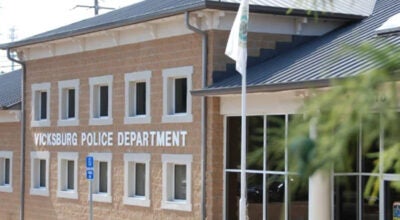Vicksburg park rangers go West to fight wildfires
Published 12:00 am Monday, September 25, 2000
Keith Billingsley, left, and Rick Martin are park rangers at the Vicksburg National Military Park who spent 2 1/2 weeks in Idaho with a 20-person crew from Mississippi helping contain the wildfires in the area. (The Vicksburg Post/PAT SHANNAHAN)
Rick Martin and Keith Billingsley know firsthand how devastating the wildfires in the U.S. West were this summer. The two Vicksburg National Military Park rangers did battle on the front lines.
Required by their jobs to be certified wildfire fighters, Martin, 46, and Billingsley, 30, spent 2 1/2 weeks, from Aug. 16 to Sept. 2, in Idaho with a 20-person crew from Mississippi doing what Martin called mop-up work on areas that had already burned.
Other team members came from the U.S. Fish and Wildlife Service, U.S. Forest Service, Mississippi Forestry Commission and the National Park Service.
“They sent us to the Rankin fire” in central Idaho, Martin said. The group also fought a fire in Marlin Springs, near the state line with Montana.
“We were on top of a mountain, and on one side of the mountain was Montana and the other side was Idaho,” Martin said. “Right on the Continental Divide.”
“We were on a hand crew,” Martin said, “And we wound up being in a mop-up situation, which means there is no initial attack, there is no real fire to be fighting.”
“Basically, the fire has already come through that area, and we’re going back to extinguish any embers,” Billingsley said.
Martin said the crew would go into the burned area about 300 feet to make sure no fire could rekindle or spread to an unburned area.
“The work, to me, is easy. It’s getting there that’s the hard part,” Martin said. “You’re coming from 300, 400 feet above sea level. We sent straight up to 8,500 feet.”
That difference in elevation was a problem for a while. The air is thinner, and breathing is harder.
The terrain was also difficult.
“We found that Idaho doesn’t have any flat ground,” Martin said.
The crews used common tools such as shovels and chain saws and some more specialized firefighting devices. One is a Pulaski, an ax on one side and a mattock blade on the other. Another, a McCloud, also is a combination tool with rake teeth on one side and a wide cutting blade on the other.
The Vicksburg men said 16-hour days were the norm, and the biggest hazards were from smoke and haze. Billingsley came home with a respiratory infection.
However, they said it could have been worse.
“If you’ve been in an initial attack, you’re going to be coughing up black stuff for a week after you come back,” Martin said.
The accommodations also presented challenges, they said.
“Keith and I didn’t have tents the first three days we were out there. Finally, after three days, they finally got us a tent,” Martin said, adding that their beds were sleeping bags.
Meals were something the firefighters didn’t have to worry about. They got hot meals in the morning and at night. Midday meals were either box lunches or military Meals Ready to Eat.
“On the Rankin fire, I thought we were eating pretty good. But on our way to the Marlin Springs fire, we stopped at another fire camp and we thought we were in heaven because food there was great,” Martin said.
The Idaho fires were among the blazes this summer that also burned thousands of acres in California, Colorado and Montana.
The two Vicksburg men said their trip was not without excitement.
One time, they rode to a work site in a helicopter and the two Vicksburg men were crammed into the seat with a third man. Another time, a copter was preparing to drop a cargo net of supplies to the crew when wind caught the net and blew it into a tree. The men thought the pilot had lost control, but he was able to pull the aircraft back and get the supplies in after two more tries.
The trip was not work all the time. Martin and Billingsley had a little time for some sightseeing. They were in an area where the Lewis and Clark expedition passed through in 1804-06 and they visited a group of stone-lined caches that members of the party built to store supplies for their return trip.





